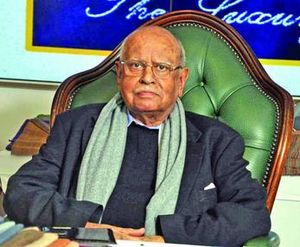Adarsh Sein Anand facts for kids
Quick facts for kids
Adarsh Sein Anand
|
|
|---|---|
 |
|
| 29th Chief Justice of India | |
| In office 10 October 1998 – 1 November 2001 |
|
| Appointed by | K. R. Narayanan |
| Preceded by | Madan Mohan Punchhi |
| Succeeded by | Sam Piroj Bharucha |
| Chairman National Human Rights Commission | |
| In office 17 February 2003 – 31 October 2006 |
|
| Chief Justice in Madras High Court | |
| In office 1989–1992 |
|
| Chief Justice of Jammu and Kashmir High Court | |
| In office 11 May 1985 – 23 October 1989 |
|
| Personal details | |
| Born | 1 November 1936 |
| Died | 1 December 2017 (aged 81) Sector-14, Noida, Uttar Pradesh |
Adarsh Sein Anand (born November 1, 1936 – died December 1, 2017) was a very important judge in India. He became the 29th Chief Justice of India, which is the highest judge in the country. He held this position from October 10, 1998, to October 31, 2001.
His Life and Career
Adarsh Sein Anand studied at GGM Science College in Jammu, Lucknow University, and University College London. After finishing his studies, he became an Advocate (a type of lawyer) on November 9, 1964. He worked on cases related to criminal law, constitutional law, and election law.
He started his journey as a judge on May 26, 1975, at the Jammu and Kashmir High Court. A High Court is a main court in a state or region. He later became the Chief Justice of that court on May 11, 1985. Then, he moved to the Madras High Court as its Chief Justice on November 1, 1989.
On November 18, 1991, he was appointed as a Judge of the Supreme Court of India. The Supreme Court is the highest court in India. After his time as Chief Justice of India, he became the head of the National Human Rights Commission on February 17, 2003. This commission works to protect people's rights.
In February 2010, he was chosen to lead a special committee. This group looked into the safety of the Mullaperiyar Dam in Kerala. The committee gave its report on April 25, 2012.
Awards and Recognitions
Adarsh Sein Anand received many honors for his work.
- In 1996, he was chosen to be the President of the International Institute of Human Rights Society. This group focuses on human rights around the world.
- In 1997, he became the first Indian to receive a special award called the Fellowship of University College London. This was the university where he had studied.
- He was also made the Executive Chairman of the National Legal Services Authority (India) in July 1997. This group helps poor people get legal help.
- He was also made an Honorary Bencher of the Inner Temple in London, which is a special title for legal experts.
- He wrote a book called The Constitution of Jammu and Kashmir - Its Development and Comments.
- On January 26, 2008, he received the Padma Vibhushan. This is the second highest award a civilian can get in India.
He also received several honorary degrees from different universities, recognizing his important contributions to law and justice. These included degrees from Lucknow University, Jammu University, Punjab University, and Banaras Hindu University. He also received awards for his commitment to national progress and human welfare.
 | Laphonza Butler |
 | Daisy Bates |
 | Elizabeth Piper Ensley |

